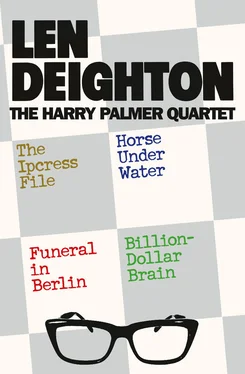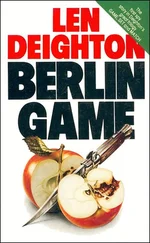Should I continue to fool with the leads in the house business? What leads? I decided to sound out Ross. I’d see whether his department were going on with it. I took a cab down to a sleazy drinking club off Jermyn Street. It was a couple of rooms on the first floor. Red plush everywhere, and not a chink of daylight. Beyond the highly polished baby grand piano, and a vast basket of too perfect flowers, sat a balding man with spectacles and a regimental tie. It was Ross. He was at least half an hour early. I sat down next to him. Our weekly meetings usually took about ten minutes and consisted of agreeing to the Army Intelligence Memoranda sheet for the Cabinet, and an inter-change of certain financing arrangements for which our two departments overlapped. The waiter brought me a Tio Pepe and Ross ordered another pink gin. He looked like he’d had a few already. His big domed frontal area was wrinkled and pale. Why did he like this place?
He asked me for a cigarette. This wasn’t like Ross, but I flicked him a couple of inches of Gauloise. I ignited it. The match lit the interior like a magnesium flare. Sammy Davis sang, ‘Love in Bloom’ and a gentle firm Parker-like sax vibrato made the plastic flowers quiver. The barman – a tall ex-pug with a tan out of a bottle, and a tie-knot the size of a large garden pea, was rubbing an old duster around spotless unused ashtrays and taking sly sips at a half-pint of Guinness. Ross began to talk.
‘To be frank, the memorandum isn’t quite ready yet; my girl is typing it this afternoon.’
I was determined not to say ‘That’s OK.’ The odd couple of times I had been late with my data Ross had ‘hurumped’ for half an hour. Ross looked at me for a minute and tugged his battered black pipe out of his pocket. He still had my Gauloise only half-finished. Ross was in a nervous state today. I wanted to know if he intended to have his people continue to work on the ‘haunted house’ as someone had christened it. I also knew that with Ross the direct approach was fatal.
‘You’ve never been down to my little place, have you?’ It was pretty rhetorical. The idea of Ross and I having an overlapping social life was hilarious. ‘It’s quite pretty now; at the bottom of the garden there are three lovely old chestnut trees. Laid out between them Anna Olivier, Caroline Testout and Mrs John Laing. When the yellow catkins are on the trees in June, with Gustave Nabonnand and Dorothy Perkins, why you could be in the heart of the countryside. Except for the house next door of course. Those chestnuts when I bought the place in 1935, no, tell a lie, end of ’34, the builders would have cleared the site bald. It was country then, not a house for miles – behind us, I mean; next door was there. Didn’t have a bus service, nothing. Mind you, didn’t affect me much. I was in Aden by the summer of ’35. My wife, you’re not married, but my wife, a wonderful woman, at that time the garden – well, it was nothing. Hard work, that’s all. I was only a lieutenant then.’
‘Ross,’ I said, ‘Mrs Laing and Dorothy Perkins are roses, aren’t they?’
‘Of course they are,’ said Ross. ‘What did you think they are?’
I tilted my forehead at the inquiring look of the barman, and a Tio Pepe and pink gin arrived very promptly. He paused long enough to give our ashtray a rebore. Ross had paused in his house agent but he soon went into it again.
‘I was at the SCRUBS in ’39, *gave me a chance to get the garden going. That’s when I put the acacias in. It’s a picture now. A three-bedroom one only seven doors away, not a patch on ours, not a patch, went for six-and-a-half thousand. I said to the wife at the time, “Then ours must be worth eight.” And we’d get it too. It’s fantastic the prices detached ones go for.’ Ross swallowed a gulp of pink gin and said, ‘But the truth is –’
I wondered what the truth was and how long it would take to get round to it.
‘The truth is with the boy at school, and at a critical time – couldn’t possibly cut back on the boy now, he’ll be at university in eighteen months; well, truth is it’s been a frightful expense. You’ve always been a bit of a, well I might almost say a protégé of mine. Last year when you first started hinting about a transfer, well, I can’t tell you the hoo-ha there was in the C5 subcommittee. You remember O’Brien, why, he even said it to you. But I just thought you were the sort worth sticking by. And well, I was right, and you’ve turned up trumps.’
This cant from Ross was more than I could stand – all this ‘sticking by you’. What did he want – money, a transfer, Dalby’s job? It was way out of character except in that it was badly done. Everything Ross handled had that in common. Did he want a fiver? Five hundred? Did he have the imagination to ask for much more? I wasn’t enjoying seeing Ross crawl but he’d given me so many toffee-nosed dressing downs that I didn’t feel inclined to soften the way for his application. But now he was changing his line.
‘With Dalby away and you running the show, well, it’s been mentioned, the Minister’s private secretary was most pleased with the Swiss Bank stuff. You have someone inside?’ He paused. It was a question, but not one I felt like answering. ‘Will he go on with giving us names and code-numbers?’ He paused again, and I remembered all the difficulties he’d made for me when I did the deal with the bank. ‘Oh, I see I really shouldn’t ask. But the important thing is you are getting known. To be frank, it means that you won’t be stuck in a cul-de-sac the way I have since Joe One.’ 1
I muttered something about it being an important cul-de-sac.
‘Yes, you think so, but not everyone does, you see. Frankly I’m walled in, financially. Now take the case of the Al Gumhuria file.’
I knew the Al Gumhuria work; it was one of Ross’s favourites. Al Gumhuria was Nasser’s house organ, the official news outlet. Ross had got through to someone working on it. Later on, when Al Akhbar (The News) , Cairo’s best-known newspaper, and Al Ahram (The Pyramids) were nationalized, his contact had even more sway.
From his agent there Ross had built up a complete picture of the Russian military aid throughout the Near East.
Ross’s people still had a few strings to pull even in Nasser’s government, and his boy there never looked back. But as his standard of living rose, so, he thought, should the payments for his extra-curricular activity. I could see Ross felt badly about losing one of the best contacts he’d ever made, just for the sake of a few thousand quid, and I’d heard from devious sources that his agent was beginning to dry up. Probably doing a deal with the Americans for ten times what Ross was paying. If his contact moved on, you could bet the Onassis yacht to a warm snowball that Ross would finally lose the whole network.
‘You could do great things there, great things, but I just haven’t got the money, or department to do it. I can see the sort of report you’d do. It would go to minister level without a doubt. Minister level.’
He sat and thought about minister level like he’d been asked to write the eleventh commandment.
I nudged his reverie. ‘But I don’t even have a file number on it. You’ve got it.’
‘Precisely, old boy. Now we’re getting down to tin tacks. Now if I were a stranger, you’d have the funds to buy a dossier, wouldn’t you?’ He rushed on without pausing. ‘You have more leeway in these things than I have, or we have, I should say. Well, for a fair sum it’s all yours.’ He sat back but he didn’t relax.
At first I thought I had trouble understanding him, so I played it back at half speed.
‘You mean,’ I said, ‘that my department should buy this file from your department?’
Читать дальше












